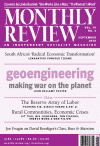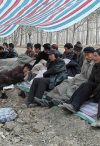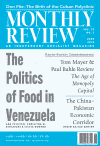Movements

One of the horrors of the capitalist system is that slave labor, which was central to the formation and growth of capitalism itself, is still fully able to coexist alongside wage labor. But, as Karl Marx pointed out, it is the fact of being paid for one’s work that validates capitalism as a viable socio-economic structure. Beneath this veil of “free commerce”—where workers are paid only for a portion of their workday, and buyers and sellers in the marketplace face each other as “equals”—lies a foundation of immense inequality. Yet workers have always rebelled. They’ve organized unions, struck, picketed, boycotted, formed political organizations and parties—sometimes they have actually won and improved their lives. In his timely and innovative book, Michael D. Yates asks if the working class can, indeed, change the world. | more…

In this excerpt from his forthcoming title, Can the Working Class Change the World?, Yates details the historical development of the working class—its potential for (and barriers to) unity, and how it is still the only force in society that can bring about its fundamental, radical transformation. | more…

Although the 1967 revolutionary armed peasant uprising in Naxalbari, at the foot of the Indian Himalayas, was brutally crushed, the insurgency gained new life elsewhere in India. In fact, this revolt has turned out to be the world’s longest-running “people’s war,” and Naxalbari has come to stand for the road to revolution in India. What has gone into the making of this protracted Maoist resistance? Bernard D’Mello’s fascinating narrative answers this question by tracing the circumstances that gave rise to India’s “1968” decade of revolutionary humanism and those that led to the triumph of the “1989” era of appallingly unequal growth condoned by Hindutva-nationalism, the Indian variant of Nazism. | more…

Founded in the late 1960s and recently revived, the radical organization Science for the People did—and does—far more than just publish a magazine. Chapters are forming around the country, including physicists, engineers, and biologists, as well as representatives of other scientific groupings and social movements. We at MR welcome the return of this great publication and movement of the U.S. left. | more…

Since the late 1990s, China’s economic expansion has depended on an immense pool of cheap labor. Today, as wages increase and manufacturing operations leave the country, there are constant complaints about shortages of peasant workers. But has China really entered a new era of labor shortage? | more…

Throughout China’s nearly seventy-year history of industrialization and financialization, whenever the cost of an economic crisis could be transferred to the rural sector, capital-intensive urban industries have had a “soft landing” and existing institutional arrangements have been maintained—a pattern that continues today. We argue that Chinese peasants and rural communities have rescued the country from no fewer than ten such economic crises. | more…

With the eruption in March of the scandal around Cambridge Analytica and Facebook, articles raising the alarm on “surveillance capitalism” are suddenly everywhere. The term, which was coined in MR in August of 2014, was developed to highlight the links between digital spying systems and contemporary capitalism as a whole. Academic interpretations of the concept effectively divorced surveillance capitalism from class analysis, and from the overall political-economic structure of capitalism—as if surveillance could be abstracted from monopoly-finance capital as a whole. | more…

Few countries and political processes have been subject to such scrutiny, yet so generally misunderstood, as Venezuela and the Bolivarian Revolution. This is particularly true today, as the international media paints an image of absolute devastation in the country, wrought by failed policies and government mismanagement. One way to comprehend the complexities of what is happening in Venezuela today—missed entirely by the dominant, mainstream narrative—is by homing in on the dynamics around Venezuela’s most highly consumed staple foods. | more…

The neoliberal restructuring of U.S. higher education is widely recognized, but nonetheless treated superficially and piecemeal in most left analyses, with little critical understanding of its inner political-economic logic. It is here that American observers have the most to learn from their British counterparts. | more…

Thoughts on the Transition between Modes of Production on the Occasion of the Marx Bicentennial
Revolution is still on the agenda for the global periphery. Restorations in the course of socialist transition are not irrevocable—and in the weak links of the center, breaks in the imperialist front are not inconceivable. | more…

The Manifesto‘s analysis of the capitalist crises that “put on its trial, each time more threateningly, the existence of the entire bourgeois society” remains central to any attempt to predict the events of the coming years. | more…

The Struggle for Abortion Rights in Poland
In October 2016, cities across Poland were seized by massive demonstrations against proposals for a total ban on abortion. Whatever their ultimate outcome, the protests prove that mass mobilizations are possible in today’s Poland, and that the right’s political and cultural hegemony may yet be more fragile than it appears. | more…











